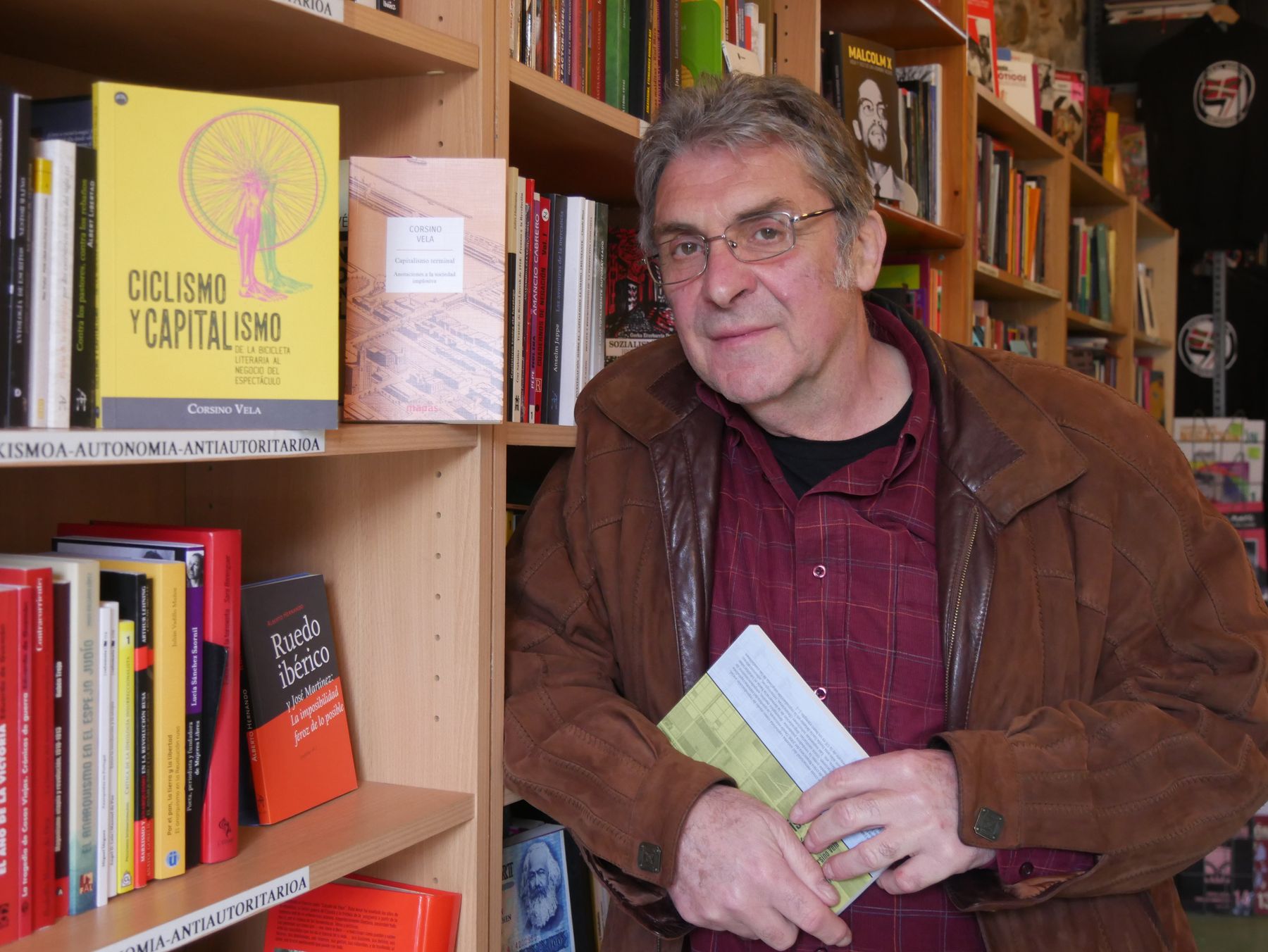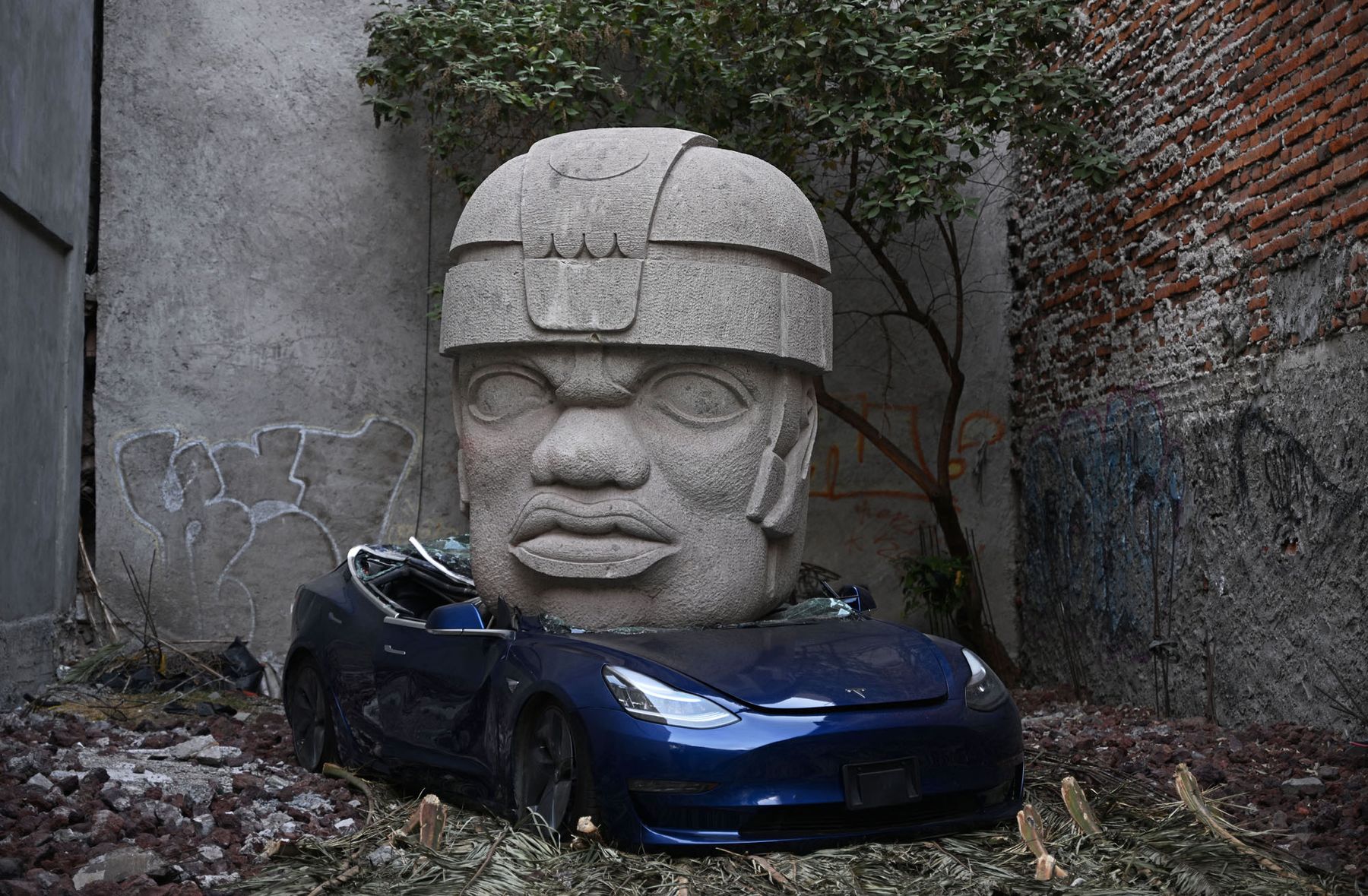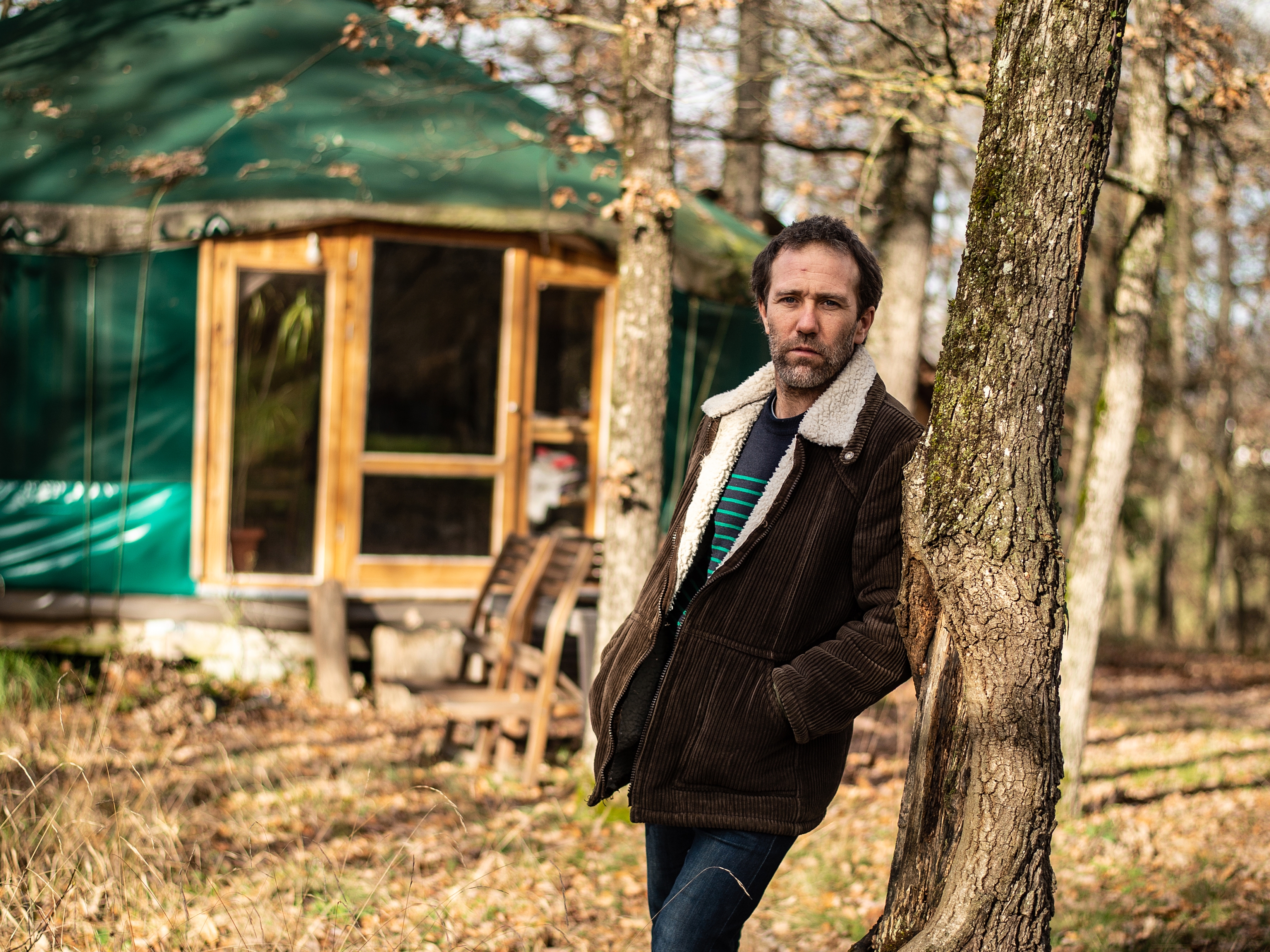"The nostalgia of the welfare state is promoted, but the conditions that allowed it do not exist"
- Corsino Vela (alias) was born in Asturias in 1953 and lives in Catalonia in the last decades. He has recently toured the Basque Country to present the book Pathological Capitalism. This work, which has drawn from the hand of Kaxilda's friends in Donostia, has given continuity to the analysis started with The implosive society (Extreme Ideas, 2015) and Terminal Capitalism (Dream Dealers, 2018). We have met him in Bilbao.

He has accidentally formed a trilogy about capitalism, and that's what he started with the book Implosive Society. There he explained that the engine of capitalism has definitely been annoyed. The
main reason is that the possibilities of the expansion of capitalism in the world, that is, the process of capital valuation and accumulation, are increasingly limited. This is reflected in the impossibility of finding new exploitation frameworks, both in terms of labour force and the exploitation of natural resources. It is true that exploitation continues, but it is not capable of revitalizing the world economy.
This structural problem is manifested in the economic and socio-economic crises, for example, in 2008, in the form of a financial crisis, as a consequence of the real estate disaster. But we must not be mistaken, the crisis of banks, mortgages and property is the consequence of the crisis of capitalism and not the cause. The root of this is that capitalism is not able to achieve a rate of return sufficient to ensure economic growth.
Before there has been no such serious moment in history, but in “subjective” terms, the responsiveness to capitalism is far below the historical necessity. An example of this is trade union back-action, which calls for the defence of jobs in developed countries, where the capitalist class does not see the maintenance of the workforce necessary to ensure its capital accumulation. So things, they throw that workforce out of the market.
You believe that the pandemic has brought together and fueled the crises that capitalism has delayed, such as debt and relocation.
The pandemic accelerates the structural crises. In general, capitalism has led to excessive growth in non-productive activities. This has been recognized by Governments, noting that some economic sectors were not fundamental. These sectors were the majority in comparison to the productive sectors. And in addition, the productive ones never stopped.
It is sold here that the socio-economic crisis has been the impact of the health crisis, and it has been the opposite. Since the last decades of the twentieth century, capitalism has been in a flight to avoid various crises. Some of them emerged in 2008 and, despite the rescue of banks and the over-exploitation of the workforce, it has not been sufficient to achieve economic growth and capital accumulation. The pandemic has inevitably deepened and accelerated these problems, disrupting all reproduction processes.
Have you said that there are several crises behind capitalism, would you explain it better,
please? Relocation initially produced good results and the accumulation of large amounts of capital. However, they are being repeated in those countries of the South that took the production, the II. After the World War, conditions prevailed in the center of capitalism, the rise of the forgave labor movement. This is causing a new relocation of some Asian sectors. For example, the textile industry has recently been moved from China to Vietnam and Cambodia.
This means that the business cycle of capital, based on accumulation and return on investment, is becoming shorter and shorter. Because of its small size, competitiveness among capitals is very high and there is instability in the market, in society and among class authorities.
“The level of consumerism necessary for the recovery of capitalism is not sustainable for the biosphere”
On the other hand, credit was a valid mechanism for the expansion and annulment of the balancing labor force of capital in capitalist countries. The latter was caused by relocation. Credit has facilitated consumption and mortgages, but the working class has become so precarious about relocation, that credit cannot be returned.
This, in turn, has led to the failure of the banks. In 2008, it was a mortgage, but now there are real estate, business, private and state loans. Moreover, states have issued a public debt to enable the welfare society, which is also a snowball. More appropriations are required to pay interest on debts, not the same debts. This leads to increased dependence among countries.
Some countries have purchased public debt from others, in some cases through pension funds. Even if it seems contradictory, the nations that have left the money, the wealthy, cannot allow debtors to fall because they too would go behind. That is the case of Greece. It has recently begun to appear in the media. Pandemic accelerates government debts with new credits to cope with the emergency situation. The European restructuring plan is still along these lines.
In his last book he suggests that many work models are neither productive nor necessary, and that the workforce, the workforce, is in danger of disappearing.
The pandemic caused widespread disruption of economic activity; production, services, transportation... In view of this, the urgent response has been to guarantee the minimum conditions for the survival of citizens through the supply chain.
In this context, the motto “key activities” has first highlighted the existence of enormous unproductive work. Sometimes, in addition, this work is counterproductive, as it produces environmental or human damage. But these activities are essential for the accumulation of capitalism. On the other hand, there are activities that favor the continuity of society for life. The pandemic has revealed this dichotomy or contradiction.
It is important to note that now it is not time to highlight the issue of the productive structure, as in the era of the expansion of fordist personnel. What's on the table is the reproduction of life. In this sense, the political and economic criticism of feminism is very appropriate and enriching, because it influences it.

As you mentioned political criticism, many years ago you pointed out that attempts to resurrect Keynesianism are absurd and you have named those who do it “left of capital”. The success of Keynesianism came from the
hand of capitalist development, II. After the World War. In fact, relocation and funding were the capital instruments to respond to the limits of Keynesianism. The left of capital, the left that manages the living conditions of capitalism, wants to reactivate Keynesianism by retaining the welfare state. This is not feasible, as the decline in investment capacity and the inability to create new markets prevent capital accumulation, despite the overexploitation of labour and natural resources in peripheral countries.
In any case, the left of the capital has not critically reviewed Keynesianism. Only this welfare state was viable II. Because after the World War there was the phase of capital expansion, everything was unrebuilt and the workforce exploded. Not forgetting that the natural resources of Africa, Asia and America were stolen and wealth ended in the central countries of capitalism.
Finally, the concept of welfare society is related to consumption. In short, without criticism, it promotes the nostalgia of the welfare state, without taking into account that the conditions that allowed it do not exist, or at least are possible for more and more people.
In the context of consumerism, beyond moral criticism, you believe that fewer and fewer people will be able to consume, which in turn plunges more into the consumer critical capitalismo.La that appears in the
expansion phase of the welfare society, such as that of May 1968, had a moral component. Today, without abandoning the moral component, consumerism is manifested as a historical problem of urgency: the level of consumerism necessary for the recovery of capitalism is not sustainable for the biosphere. Physically it's impossible, and that's in the middle.
However, consumerism has begun to be detrimental to capital accumulation in central capitalist countries, due to recycling costs. This absurd activity, which is inconsistent with life, has become an expense for capital that it cannot afford.
Although you are opposed to providing solutions or formulas, in the future you will see two paths. Or to definitely follow the tendency of capitalism until it collapses, or to structure resistance, out of the paradigm of parties and unions. The
pandemic has shown that the crisis of the capitalist model has left the model of the struggle for capital unturned. This has led, for example, to the crisis of trade unionism and forms of political representation. The obsolescence of leftist movements that wanted to recreate democracy is evident, appeared in 2011 in the M-15 plazas and has been exhausted. They are not able to give way to the crisis of capitalism, because the crisis has come forever, it will be continuous if we do not leave the logic of capital.
“The welfare state is not viable due to the decline in capital investment capacity and the inability to create new markets”
In order to get out of this situation of paralysis, rather than out of the crisis of capitalism, a historic process that does not go back, the need to get out of capitalism must be put on the table.
To achieve this, we have to look for it in autonomous, anti-capitalist experiences, the resistance of the worker, in which combat communities have been formed in the face of the capital, but not in a nostalgic way. What we have to do is to pull its thread, starting from the current conflicts, by redefining Community trends. We must give up thinking that these struggles are objective or alternative, as proposed by Marxism or anarchism. On the contrary, we must work them as a possible trend. In fact, the proposals of the logic or community resistance of decaying capital, other forms and relationships of life or food, will prevail in conflicts based on relations of force. It is not a programme, but the trend that must be understood in each conflict, what is to be carried out or not.
Finally, he has also presented the book Cycling and Capitalism, how was this text created? The
origin of the book is the hobby, as a cycling enthusiast, I find it curious that the bicycle and the capitalist system have had a parallel development. Cycling itself as a spectacle if it is a commercial phenomenon. So things, I just wanted to underline this paradox between subjective emotion and capitalist logic. In this sense, cycling and cycling are the products of capitalist society.
In the book I have made a historical tour. For example, the cyclist literature has been the object and repetitive theme in the twentieth century. Bike and cycling appear on several occasions in the novels. I have analysed cycling from the point of view of industrial production and spectacle. Whether a woman or a man, it is an industry that maintains a relationship with the bicycle, just like the worker with the factory. In this sense, it is a criticism of the political economy of cycling, but also of the demands and defense of the cyclist, a proletarian subject and subject to the ferrous laws of exploitation.
“Houston, we have a problem!”
Well, to say that we have a single problem, as things are, can be a temerity, but this time I want to focus on an issue that concerns us and affects us internally, mental health.
Historically, suffering has had a profound meaning and meaning... [+]
























